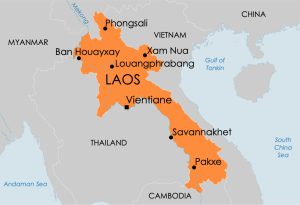 UPDATE 29 JULY 2024: The six Christians were released without charge on 25 July after over a month in Xaibouathong district prison. A local source told Barnabas Aid, “The authorities have warned them and said to do only low-key Christian ministry or they will have problems again.” Pastor Mum reportedly had his hands and feet chained in prison and was held separately from the other Christians.
UPDATE 29 JULY 2024: The six Christians were released without charge on 25 July after over a month in Xaibouathong district prison. A local source told Barnabas Aid, “The authorities have warned them and said to do only low-key Christian ministry or they will have problems again.” Pastor Mum reportedly had his hands and feet chained in prison and was held separately from the other Christians.
Six Christians from Tahae village in central Laos’ Khammouane province were arrested on Saturday 22 June at the request of their village chief. They belong to an unregistered church that meets in the home of their pastor and were arrested during a prayer meeting in preparation for worship services the next day.
The village chief, two deputies and three other community officials entered the house and arrested Pastor Mum, two men named only as Mr Liang (40) and Mr Pa (24) and three women named as Ms Laen (50), Ms Lan (23) and Ms Khoon (28). They are being held in Xaibouathong district prison and have not yet been formally charged or given access to legal counsel or family.
Pastor Mum became a Christian in 2019 and since then he has hosted prayer and worship gatherings in his home. The number of Christians in his church grew to between forty and fifty and they were able to meet without interference from village officials until recent months. New village chief Mr Lang had them arrested them as part of a crackdown on the spread of Christianity in the village – the previous chief was reportedly more tolerant of Christians, but the election of Mr Lang in May 2024 has led to more harassment. He reportedly ordered the Christians not to worship at the pastor’s home or anywhere else in the village, so they began meeting in a rice field outside the village but were arrested when they began to construct a small church building.
Laos’ population of 7.9 million people is approximately 65 percent Buddhist, with 31 percent holding animist beliefs or following no religion, and there are around 200,000 Christians. The church has been experiencing rapid growth in recent years and has increasingly attracted opposition from those who view Christianity as a Western religion and those who are concerned that it will interfere with local worship of idols and spirits. The Lao Evangelical Church, which is one of three officially-recognised denominations along with Roman Catholics and Seventh-day Adventists, has many congregations but most do not have church buildings and meet in houses.
The Communist government recognises Buddhism, Christianity, Islam and the Baha’i faith, but gives priority to Buddhism. Article 30 of the Lao Constitution recognises the right and freedom of the Lao citizens “to believe or not to believe in religions” but religious freedom is often restricted in rural areas where local authorities, especially in isolated villages, discriminate against religious minorities, particularly Christians, and sometimes expel them from their villages for refusing to renounce their faith.
The Lao government at national and local level monitors and restricts religious groups and requires them all to register with the Ministry of Home Affairs (MOHA), which is slow to respond to applications, and even when the MOHA grants legal status it is often ignored by state and district officials in remote areas.
In February 2024 a Protestant church building was destroyed in Kaleum Vangke village in Savannakhet province on the orders of a village elder, despite the MOHA having granted the church the right to gather.
In 2023 local authorities in Khammouane province pressurised 79 Christian families from Xaybuathong, Yommalath and Bualapha districts to sign documents renouncing their faith, while in September and October 2023 local officials in Sa Mouay district reportedly forced at least eight families out of four villages and destroyed their homes following their conversion to Christianity. Local sources said officials offered land to some of the families for rebuilding homes in one village but did not offer compensation.
(Barnabas Aid, Christian Solidarity Worldwide, Church in Chains Global Guide (4th edition), Human Rights Watcher for Lao Religious Freedom, International Christian Concern, Morning Star News, Voice of the Martyrs Canada)
